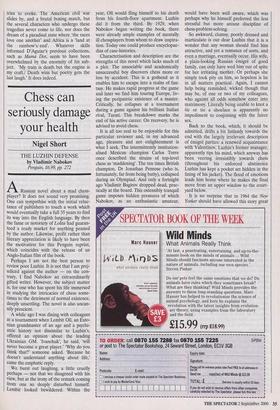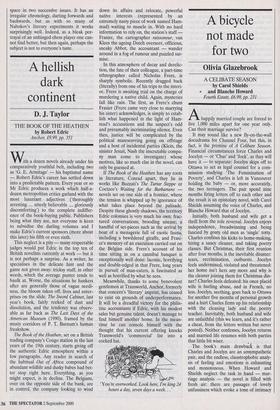Chess can seriously damage your health
Nigel Short
THE LUZHIN DEFENSE by Vladimir Nabokov Penguin, £6.99, pp. 272 ARussian novel about a mad chess- player? It does not sound very promising. One can sympathise with the initial reluc- tance of publishers to touch a work which would eventually take a full 35 years to find its way into the English language. By then the fame or notoriety of Lolita had guaran- teed a ready market for anything penned by the author. Likewise, profit rather than literary appreciation is likely to have been the motivation for this Penguin reprint, which coincides with the release of an Anglo-Italian film of the book.
Perhaps I am not the best person to review poor Luzhin. It is not that I am prej- udiced against the author — on the con- trary, I find Nabokov an extraordinarily gifted writer. However, the subject matter is, for one who has spent his life immersed in studying the intricacies of chess some- times to the detriment of normal existence, deeply unsettling. The novel is also uncan- nily prescient.
A while ago I was dining with colleagues at a tournament when Lembit 011, an Esto- nian grandmaster of an age and a psychi- atric history not dissimilar to Luzhin's, offered an opinion about the leading Ukrainian GM. `Ivanehuk', he said, 'will never become a great player.' Why do you think that?' someone asked. 'Because he doesn't understand anything about life,' came the emphatic reply.
We burst out laughing, a little cruelly perhaps — not that we disagreed with his view, but at the irony of the remark coming from one so deeply disturbed himself. Lembit looked bewildered. Within the year, 011 would fling himself to his death from his fourth-floor apartment. Luzhin did it from the third. By 1929, when Nabokov began writing the book, there were already ample examples of mentally ill chessplayers from whom to draw inspira- tion. Today one could produce encyclopae- dias of case-histories.
Characterisation and description are the strengths of this novel which lacks much of a plot. The unsociable and academically unsuccessful boy discovers chess more or less by accident. This is a godsend as it enables him to escape into a realm of fan- tasy. He makes rapid progress at the game and later we find him touring Europe, liv- ing the peripatetic existence of a master. Critically, he collapses at a tournament during a game against his brilliant Italian rival, Turati. This breakdown marks the end of his active career. On recovery, he is advised to avoid chess.
It is all too real to be enjoyable for this particular reviewer and, in my advanced age, pleasure and not enlightenment is what I seek. The intermittently institution- alised Mexican champion Carlos Torre once described the strains of top-level chess as 'maddening'. The ten times British champion, Dr Jonathan Penrose (who is, fortunately, far from being batty), collapsed during an Olympiad. And only a fortnight ago Vladimir Bagirov dropped dead, prac- tically at the board. This ostensibly tranquil game imposes hidden pressures of which Nabokov, as an enthusiastic amateur, would have been well aware, which was perhaps why he himself preferred the less stressful but more arcane discipline of chess-problem-solving.
So awkward, clumsy, poorly dressed and inarticulate is our dear Luzhin that it is a wonder that any woman should find him attractive, and yet a romance of sorts, and even a marriage, eventually occur. His wife, a plain-looking Russian émigré of good family, can only have wed him out of spite for her irritating mother. Or perhaps she simply took pity on him, so hopeless is he in all matters practical. Again, I cannot help being reminded, wicked though that may be, of one or two of my colleagues, who against all odds somehow enter into matrimony. Literally being unable to knot a tie or tie a shoelace is apparently no impediment to conjoining with the fairer sex.
Back to the book, which, it should be admitted, drifts a bit listlessly towards the end with the largely irrelevant description of émigré parties: a renewed acquaintance with Valentinov, Luzhin's former manager, apparently tips his mind, which anyway has been veering irresistibly towards chess (throughout his enforced abstinence Luzhin has kept a pocket set hidden in the lining of his jacket). The flood of emotions leads him home where he makes the final move from an upper window to the court- yard below.
It is no surprise that in 1964 the New Yorker should have allowed this story great' space in two successive issues. It has an irregular chronology, darting forwards and backwards, but as with so many of Nabokov's literary experiments it works surprisingly well. Indeed, as a bleak por- trayal of an unhinged chess player one can- not find better, but then again, perhaps the subject is not to everyone's taste.



























































 Previous page
Previous page